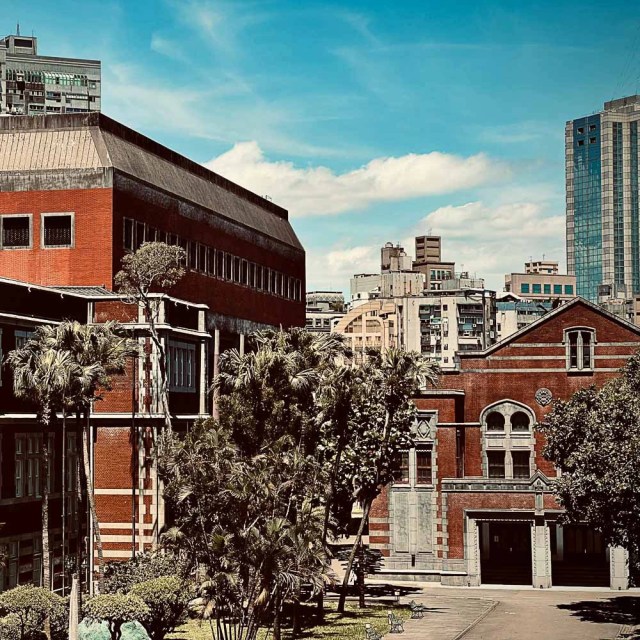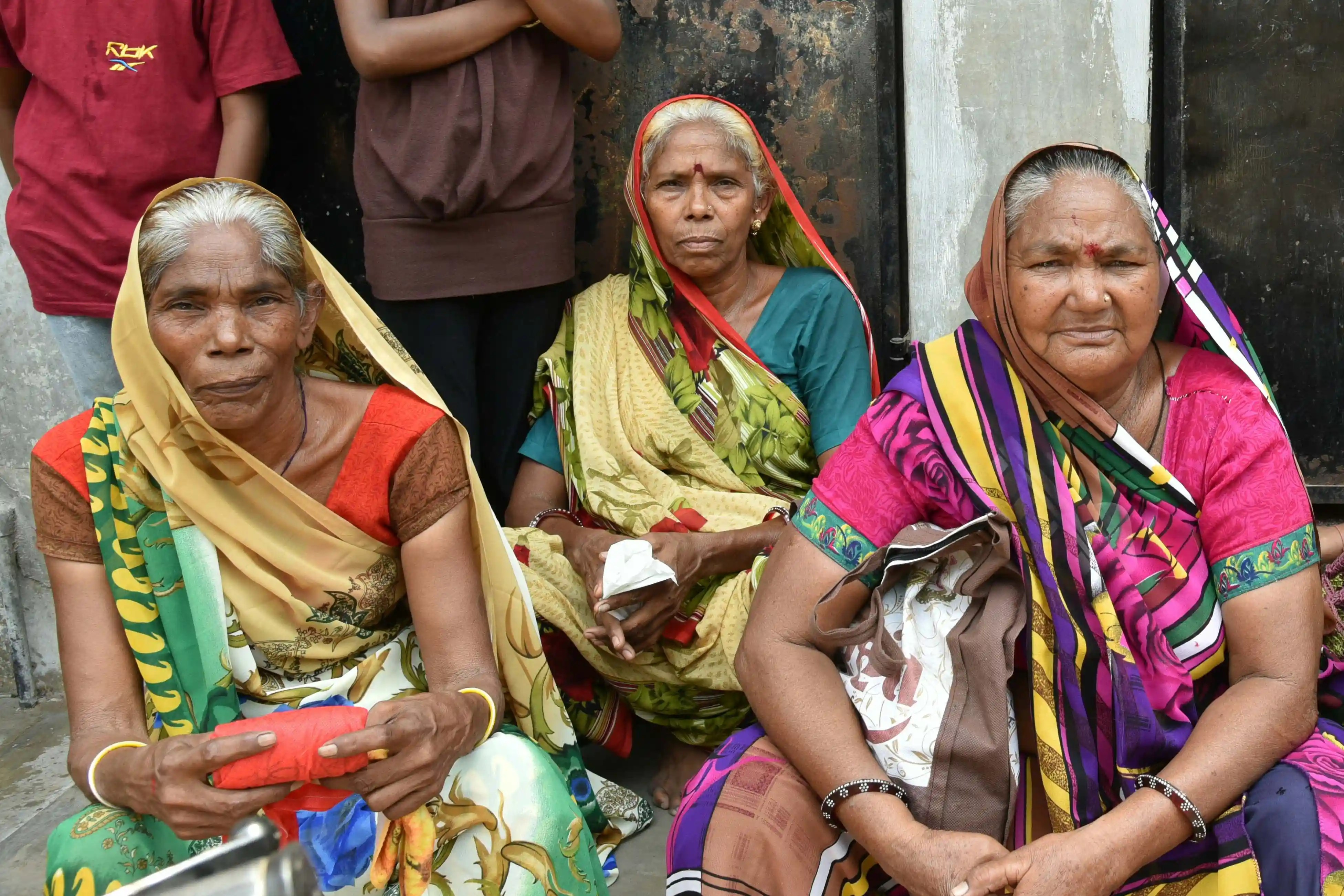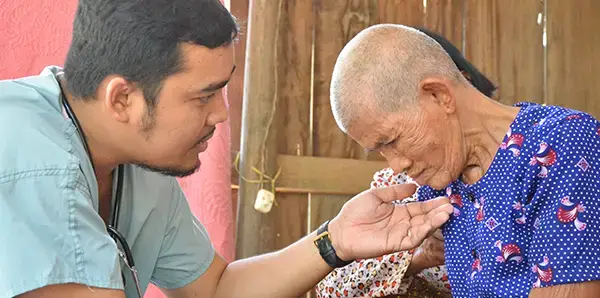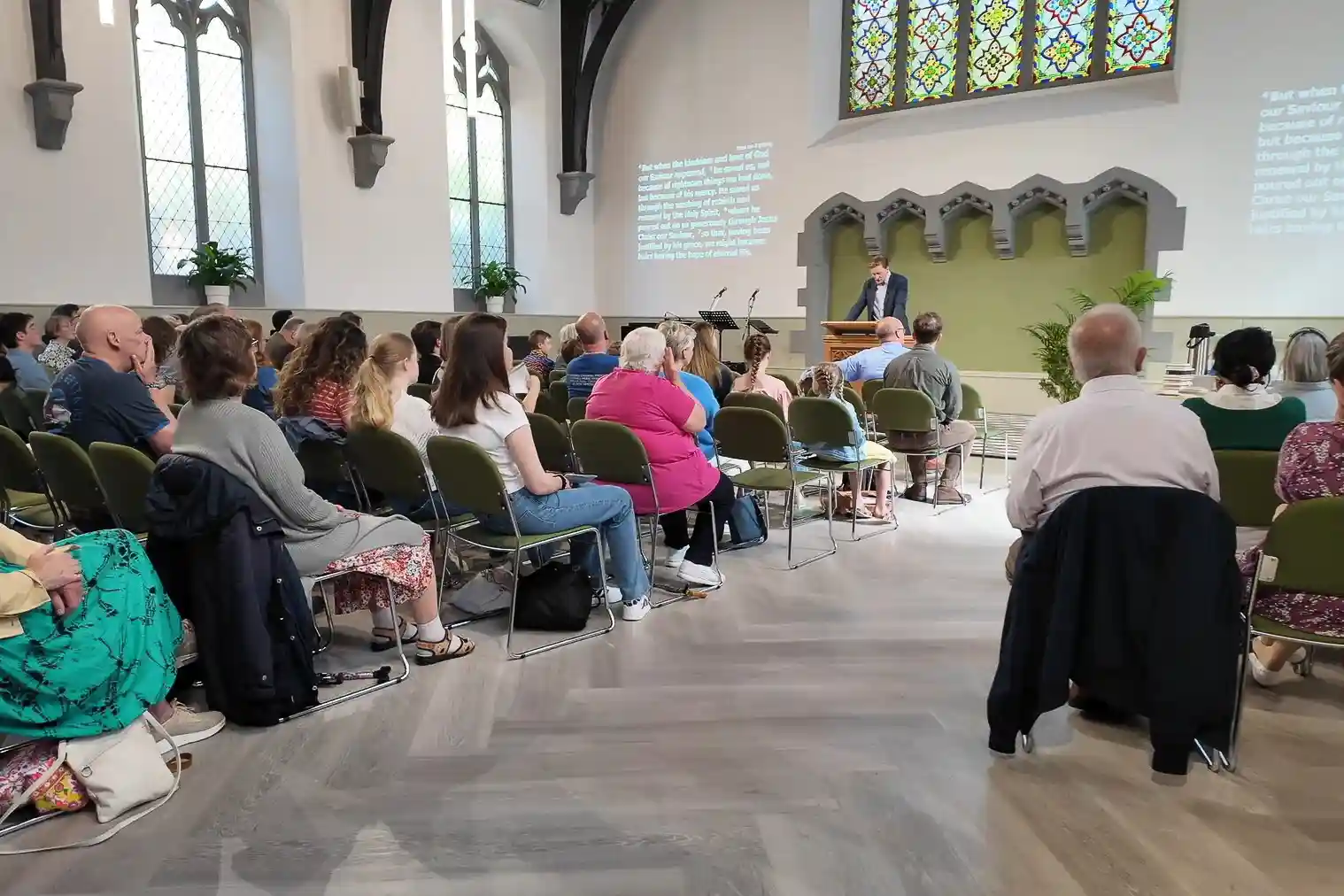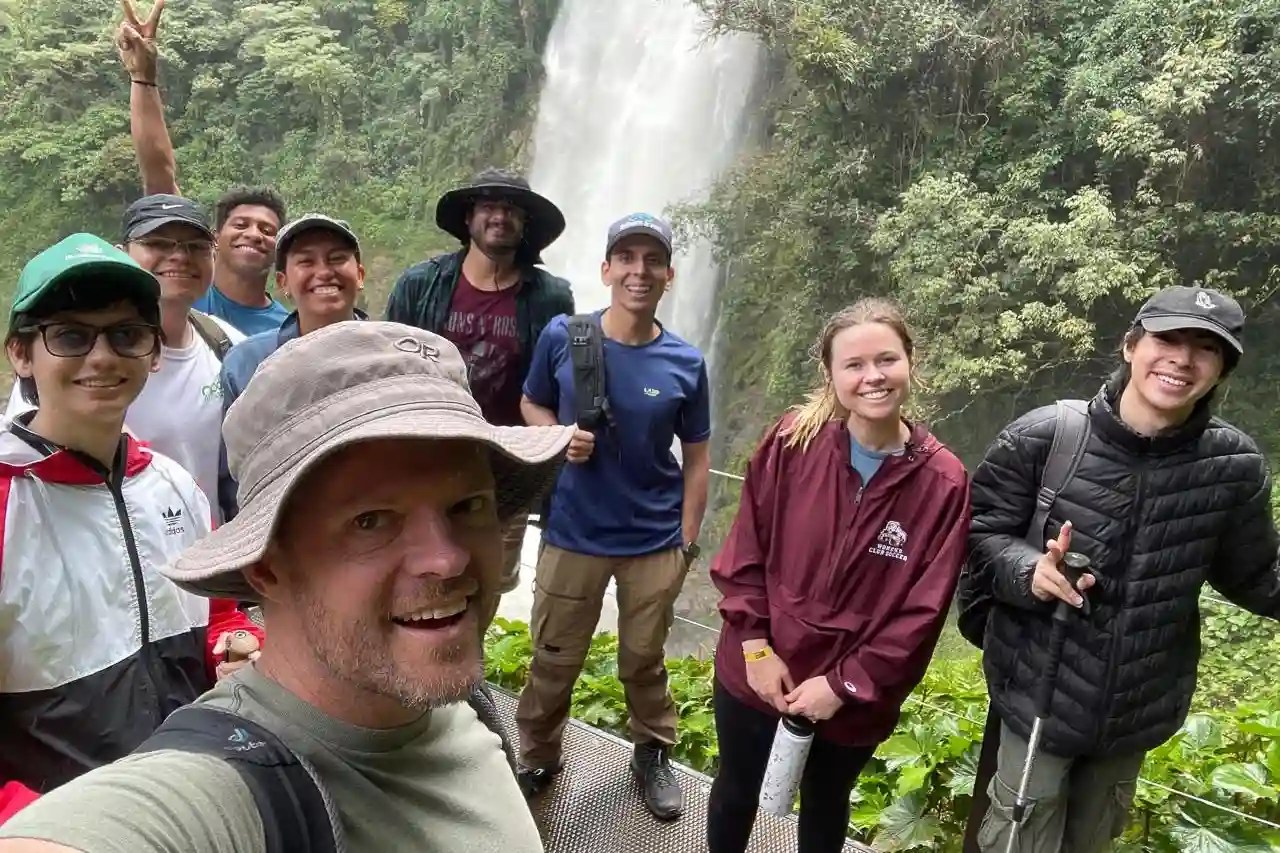Building Bridges Through Mission and Hospitality
Q&A With Russ Whitfield
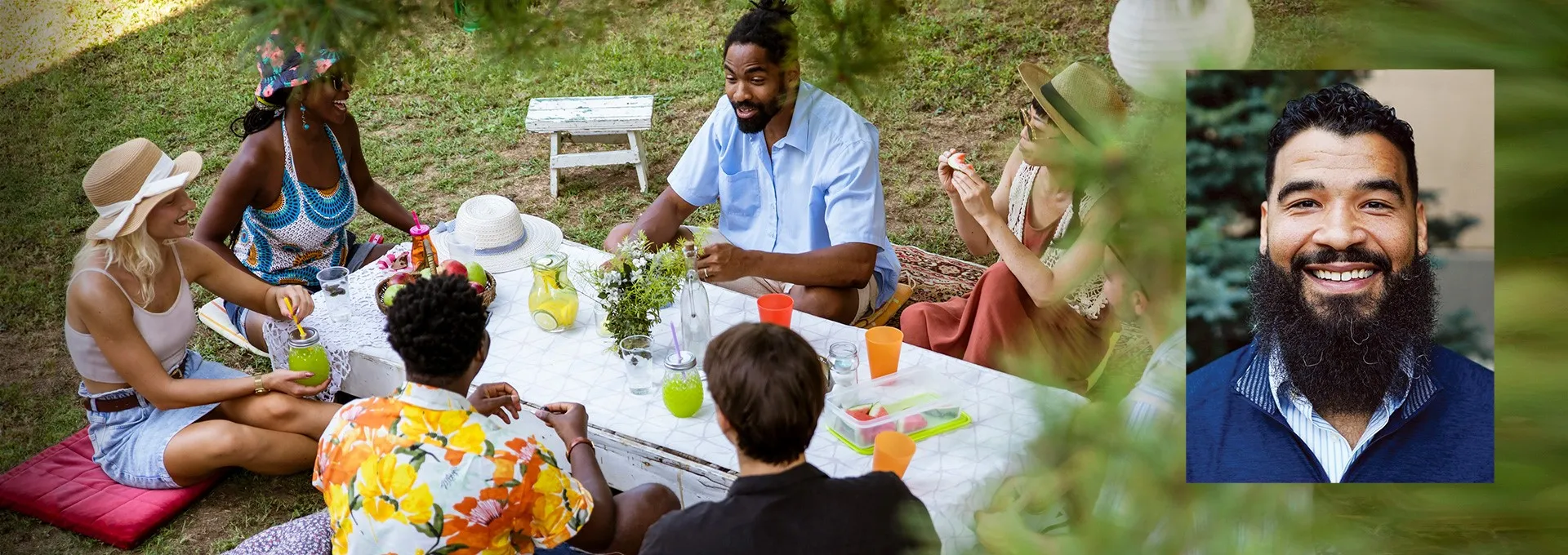
Jerry Gibson, director of our Western Hub, sat down to talk with Russ Whitfield, a headline speaker for the upcoming PCA Global Missions Conference, and founding pastor of Grace Mosaic D.C. (PCA). Russ also serves as the assistant coordinator of cross-cultural advancement for RUF, is a guest lecturer in practical theology at RTS-Washington, D.C., campus, and is deeply committed to the work of hospitality. Here are excerpts from their conversation, edited for clarity and brevity.
Jerry: Russ, tell us a little about your family. How many kids do you and Vanessa have, and what are they into these days?
Russ: Thanks for asking! So we have four kids. We have a 15-year-old. We have a 12-year-old. We got a 9-year-old. And we got a 6-year-old. Girl, boy, boy, girl.
Jerry: There you go!
Russ: They’re awesome. We love them. They’re such sweet kids. They got real faith. They’re curious about the world. What are they into? They’re into anything related to cross-cultural. They’re so curious about … like each of them is learning different languages. They like listening to music from different places. They’re into cooking. They’re their mother’s children for sure, you know.
So it’s a blessing for me because, you know, they’re growing up in a city where they don’t feel abnormal. They’re part of a church where our children’s ministry looks like a Target ad. It’s a bunch of ambiguously brown kids. They just can’t tell exactly what their ethnicity is. So that’s such a gift to me to see how they’re growing up. They love God’s church, no matter what expression they encounter. I’m thrilled about the way they’re developing in the faith. I’m super proud of them. And you know we’re facing all kinds of challenges, health challenges, and all these kinds of things. But there’s been a resilient faith that we’ve seen in our kids, and it’s been such a blessing, man.
Jerry: So the word on the street, and I’ve seen a little bit on social media, that you like to grill. So, any preferred methods on how to heat the meat?
Russ: Yeah, well, you know the priestly ministry is important according to the Word of God. So I try to make sure I maintain a faithful priestly ministry at the barbecue altar. And you know I go with our local stuff up here. I learned how to do it in Texas. Texas barbecue, that’s in my heart.
Jerry: OK, I like to hear that. You’re known for using hospitality as a big part of your ministry. How did that come about?
Russ: What’s funny is, you know, when it came to planting a church, and being around the neighborhood and trying to talk to non-Christian neighbors and figure out where people were, it became clear to me that hospitality would be the cutting edge of our mission when we planted Mosaic Church. You know, people may or may not care about what you have to say, but everyone eats, and everyone loves a party, except our blessed introverts. Bless you all! But even introverts do appreciate a party every once in a while.
Jerry: Oh they like a party, yeah, they just need their own private room, you know?
Russ: And so when we started Mosaic, I thought it would be really powerful for our neighbors to know us as a church that has a very strong celebratory dynamic, and that they taste something of the joy of the life to come by being in our midst. And so I just decided we’re going to start doing neighborhood barbecues, right? And so I would cook all this meat, neighbors would descend, and we started building relationships, and then pretty soon they became features of our neighborhood. A number of our neighbors were always asking us, When’s the next barbecue? When’s the next barbecue? And so I’ve often said our church has grown more through my barbecue than my preaching! So however the Lord wants to do it, we gotta be ready.
Jerry: Love that.
Russ: So that’s sort of like how that’s gone. I’ve just enjoyed being able to be a waiter at the parties that Jesus hosts through His Church, you know, very much like the Lord’s Table. So that the theory is, many people might begin their journey to the Lord’s table beginning at our table. So, let’s spread the table. Invite people to the feasts.
Jerry: That’s amazing! How does your church participate in these barbecues?
Russ: So when we do these things, they’re big churchwide events. I’ll cook all the meat, and then people will jump in on sides, and then we’ll have some folks who are getting a bounce house set up for the kids. And other people who have other activities for the kids. It’s really an “all hands on deck” thing. Activities for kids, bounce houses, I provide the meat, and then it’s a team effort to do everything else. Our community is totally about that and no one has to have their arm twisted. They’re ready to jump in. I do appreciate that about our church.
Jerry: That’s so cool. I love how the whole church embraces the ministry of hospitality.
Russ: We kind of created these institutions within our church year. We always do the Saturday before Palm Sunday we usually do our big spring barbecue. And the idea is we get people to come to the church property, and the next weekend is gonna be Easter. If it comes up in conversation, we have an opportunity to extend an invitation, we invite people.
But really it’s just getting people into the orbit. Like if you think about the church as like a bullseye: Sunday morning worship is the center of the bullseye. And then maybe community groups are the next ring out, and then neighborhood parties and barbecues are the next ring out. Not everyone is gonna hit the bullseye and be able to come straight into Christian worship, but our hope is that there’ll be a gravitational force where the life that we share together will eventually pull people in toward our center, which is the worship of Christ.
So that’s like the philosophy behind the ministry. So we do a spring barbecue. And then we have a series of neighborhood parties where we have live music, cooking, dancing, singing, all that kind of stuff. And you know it’s been a really important feature of our church’s culture that has really been connecting with our neighbors.
Jerry: I adore that. That’s incredible! Do you have any tips for someone who’s new to hospitality or wants to host a great meal? Or for a beginner for their meat to taste good?
Russ: I would say for the beginner, cook whatever you’re interested in cooking. Start to dig into that and start to practice. Just start to cook for your inside group, your people, your family, and if you find some winners, that’s the beginnings of being able to improve your game on hospitality. I’ve done a lot of thinking about the language of the amateur, right? A lot of times when you speak of someone being an amateur, it sort of diminishes, it steals the dignity of it. But if you look behind the word “amateur,” it comes from the root word for love. It’s someone who does something out of love. So I think to be called amateur is a high compliment. You don’t just do it out of duty. You do it for love. And I think the more and more I’ve read the Bible, the more and more I’ve come to understand some of the contours of the story of God, the more I feel like I see hospitality as central to the Christian story.
Jerry: That’s an awesome segue into crossing cultures, because obviously food and hospitality and taking time is central to the vast majority of cultures out there. You traveled a lot with PCPC [Park Cities Presbyterian Church], including trips to China and Thailand. How have those experiences shaped your approach to cross-cultural ministry?
Russ: I loved it. We just loved those trips. I wound up at Park Cities Pres. and in seminary shortly after becoming a Christian in college, and shortly after having my bell rung on cross-cultural ministry. I was in my senior year at NYU and I’d never been on a plane. I’d never left the country. Vanessa was a missionary in Honduras and she said to me and one of my friends, “You guys should come down and join me over spring break.” And I said, “On a plane?” And she’s like, “Yeah.” From the time my feet hit the ground in Honduras to the time we got on a plane to leave, I was just reeling. The Lord was waking me up to how narrow my vision had been because I grew up in the country in Western Pennsylvania. You know what they say is: In between Pittsburgh and Philadelphia is Alabama. It’s country. So even though I grew up half Black, half white, you know like that mix, it was all happening within the confines of Western Pennsylvania. And I go to New York City and it’s culture shock. But I still had not left the U.S. And when I left the country, and when I saw the condition that [the Honduran] people were in, and when I thought about their resources versus ours, their opportunities versus ours, a burden started to develop for me.
And some more mature thinking down the road. And I said, you know I don’t have to leave the country to be about this work of globalization. It’s happening. They talk about the global becoming local, and I think that’s where the seeds of planting a cross-cultural church really started to germinate—from me. Vanessa was the first person who pushed me to really start digging deeper about my narrowness of thinking and the broadness of the world. ‘Cause she had grown up in an international home, father being Haitian, her mother being Argentinean, she went to Washington International School. She was surrounded by all of this, and had learned how to appreciate and navigate and all that kind of thing. I’d never really had that.
So once that happened, I was on fire for global missions. And then, to land at PCPC. I still have never experienced a more dynamic youth ministry than we got the privilege to be a part of in Dallas. I mean it was really, really good. It was really faithful. It was full-orbed. It was the whole shebang. Discipling kids, being in their homes, going and doing Bible studies at their houses, going on their turf and then taking them on mission trips, and like discipleship 101. And the broader church–it was the whole thing.
The first time I had ever been to Asia was with PCPC to China. The second time was to go with PCPC to Thailand and Laos. And like my categories were just like being exploded and I just felt like the Lord really impressed it upon my heart like man, this is so beautiful, this is so good, this is so important. It cannot be an afterthought. It cannot be extracurricular. It can’t be an elective for those who are interested in this kind of thing—this is our story. It’s so core. And it was at that point that I realized: If global mission was not on the heart of the Church throughout its whole history, I wouldn’t be a Christian.
Jerry: Man! Amen.
Russ: You’re the ends of the earth, you know. And so it was at that early stage of my journey, my theological ministry journey where I realized that we’re the ends of the earth, and the gratitude that creates. Now I have the opportunity to go and bring to other people what has been brought to me. And I would always leave challenged and enriched, and I would always leave with much more clarity every time I’d had a chance to go to another country and serve in whatever little way I could—whether it was building houses in Acapulco, or doing a English language exchange in China. So I do feel a debt of gratitude to PCPC, for making that a part of our work and use that tremendously in my own life and ministry to make Vanessa and me who we are today.
Jerry: You’re set to speak at the PCA Global Missions Conference. What made you say yes to this opportunity?
Russ: Aside from the relational dynamic—if Jerry comes calling—it’s always been intuitive for me to participate in beautifying our little corner of the Christian Church, in whatever ways I have bandwidth and opportunity and gifts that really would serve the [church] body. The more I’ve had the opportunity to connect with people around the denomination, the more I want to see our denomination become the best version of what it can be. If we close the gap between what we say we believe and the actual lives that we live, I think we begin to see a more beautiful witness emerge. I think that the work that Mission to the World does is so important and strategic for the future life of our church. Our church has been involved in global missions from day one. And I can tell you the benefit that has brought to our community. To have the opportunity to play some small part of encouraging, catalyzing, mobilizing folks in our denomination, to participate in this work—to me is just a gift. It’s a joy. When you think about global missionaries, like that’s a different level of self-denial. That’s a different level of sacrifice. That’s a different level of taking the low place.
Jerry: One of the things that excites me the most are the ways in which we are collaborating together as a denomination. What’s your perspective on the collaboration between MTW, RUF-Global, and MNA for cross-cultural work?
Russ: I love that question. I gotta give a shout out to my brother Chad Brewer who’s doing an amazing job leading RUF-Global and RUF-I [International]. Every time I hear him talk about the vision of that aspect of RUF it just makes me want to jump out of my skin. It’s so exciting.
Part of my personal story is that I came to faith in college and I didn’t necessarily have much pastoral guidance or personal interaction with a pastor, and it was just like the blind leading the blind. And so with pastors showing up on campuses all around the world to meet students in this critical moment of their lives—where they’re working through identity, what they believe, their career trajectories—and they’re caught with anxiety and self-doubt. I cannot be more enthusiastic about the idea of seeing pastors landing on these campuses, and not only preaching the gospel to these students, not only pastoring these students through these crucial years of their lives, but also with a clear vision for integrating them into the life of the local church and showing them they have a role to play in the life of the local church. With the uptick of former RUF students who have landed in my congregation, I cannot tell you what a shot of health it has been in our congregation. And to think that could be multiplied, not just across the nation, but around the world.
I think that the combined efforts of MTW, MNA, and RUF could lead the PCA to be by definition a cross-cultural denomination. And that’s just thrilling to me. And I can’t help thinking that as we grow our presence in our ministry globally, that it will have a redeeming impact and a focusing dynamic on our life in America as the Church. I see lots of potential and I think it’s very exciting. I’m thrilled about seeing it happen. And what I hope to see down the road is that the Presbyterian Church in America actually far surpasses America, and we see that reflected confessionally in a diversity of ways. Because just as the Bible can take different cultural expression, I think our Reformed faith can take different expression. I think there will be different groups of folks around the globe who, whenever they enter into our ecclesial world and they embrace these documents, will actually come up with fresh insights about how we can work our confessional faith in more beautiful, faithful ways. And you know we’re always recruiting people. And to think that we could one day be in a moment where we have more candidates than job openings: that is beyond a dream.
Jerry: Yeah, absolutely. Let’s keep praying to that end. Where do you feel like young people are in terms of thinking about global missions?
Russ: One of the things that’s been challenging about getting young people involved in global missions is that there is a narrative that global missions was inseparable from colonialism, and colonialism’s bad, so we don’t come in and tell people. It’s almost like they see it as not a bug, but a feature of global missions by nature. Hegemonic, if I could put it that way. And I think that has caused a lot of people to look back over Christian history and the operations of nations that identified as Christian nations versus the sincere works of those who weren’t going backed by a government. They were going for the love of God, the love of people. Sometimes the way that you get closest to the truth of a narrative is you need to complicate it, not simplify it. And this is one of those cases. You could simplify it and say, Oh, yeah, all the missions that went out from Europe were just enterprises and colonialism. It wasn’t about faith; it wasn’t about the propagation of the gospel. It was about this. But that’s not the only story. There are plenty of people who risked life, who sacrificed all of their hopes and dreams, who said goodbye tearfully to family because they felt the call of God to go and share the hope of the gospel with people who had no witness. And there’s a beautiful narrative. There’s a beautiful story. And this shows up if we can look at it. But the way things are with social media and the way things are with culture, a lot of people are afraid of being the next name that’s trending and getting [canceled], because they said something or associated with somebody who had a history. And so I think a lot of people play it cautious. Also, in late modern culture, individualism and Mammon are the gods we serve. And so when people think about their lives, they think about the thing that’s gonna set them up best for that version of the good life and they’re not really thinking about faith, calling, all these kinds of things. A lot of young people feel like they have to live into that script.
But I don’t know that our young people are in touch with the stories of global missions–like the people with the big names, even the contemporary names that aren’t big names, but they’re big in God’s eyes because they’re serving His name unseen. There’s some recovery work that needs to happen. And let me just say this, too. It’s true that there are people who have gone and done global mission who have lacked intercultural competency. But just because there are people who’ve done that doesn’t mean we can’t still participate in the mission, but we can bump our intercultural competency. How do I gain greater self-awareness as I’m gaining more up-awareness of the other? I think a lot of young people when they hear “mission,” they think “colonialism.”
Jerry: What would you say to pastors and church leaders who are considering sending people to the Global Missions Conference?
Russ: Love that question. One of the first things you learn when you become a Christian is that God saves you by His grace, but then He transforms you by His grace to make you more into the likeness of Jesus. When you look at the life of Jesus, I think one of the things that’s utterly clear throughout the gospels and throughout the New Testament letters is that Jesus had an unrelenting focus on mission. He was sent by the Father. He never lost sight of His sent-ness in messages He left with His disciples. Before He went to the cross He told His disciples, “As the Father sent Me, so I send You.” If mission is on the heart of Christ so deeply, it’s on the heart of God. If we really, really want to be like Jesus, then any time we spend learning about mission, being mobilized for mission, getting catalyzed for mission, is never wasted time. It will always return a benefit not just to the individual but to the local church community. Because this is what we do, and even more, this is who we are. I just can’t figure anything else out that would emerge as more important in terms of the life of the Church. So I think that any pastor who might be on the fence about coming to the PCA Global Missions Conference should think about what it is that God put them in their role to do. Did He put us in the role just to manage? Did He put us in the role just to preach decent sermons weekly? Or did God put us in this role so that we could show our people what it looks like to participate with God in the work He’s doing in the world, and to enjoy communion with Him and with one another, and to enfold our neighbors into that same story. I just think, man, it’s never a wasted moment. It’s never wasted time there. There is nothing more pressing than our mission.


